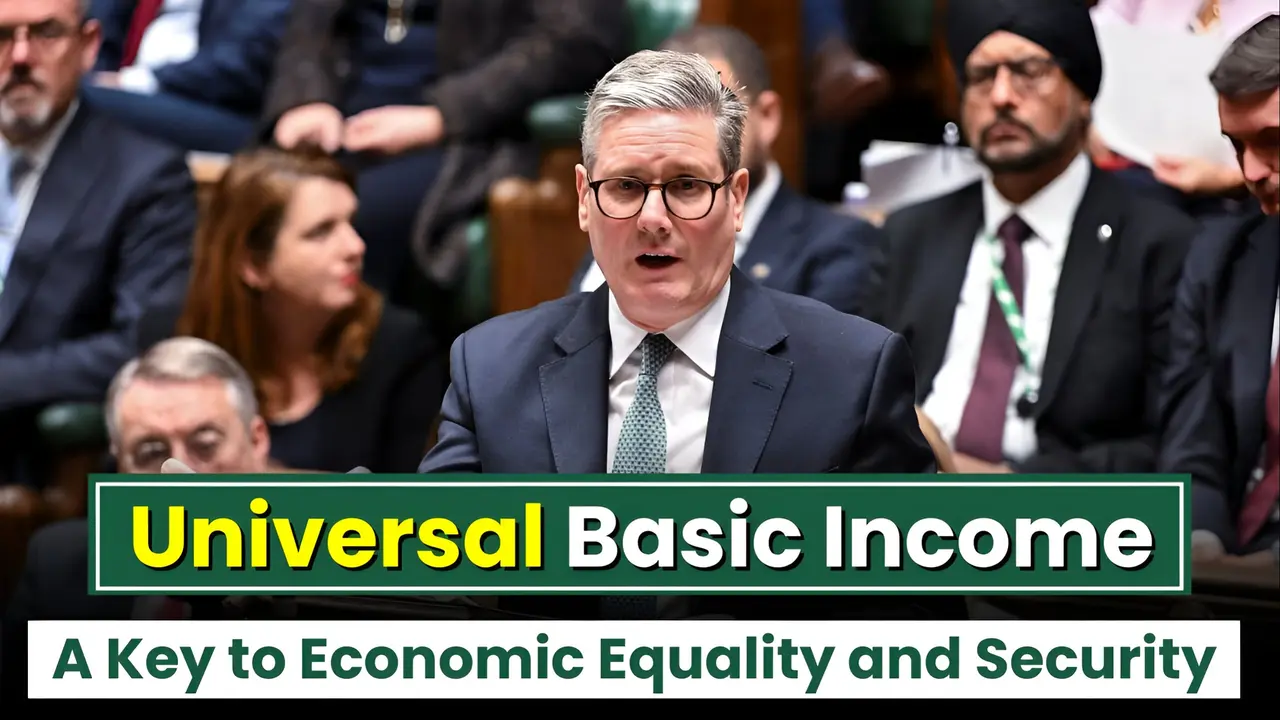Universal Basic Income (UBI) has been an idea discussed by economists, politicians, and social activists for years, and it is gaining increasing attention as a potential solution to economic inequality and job insecurity in the modern world. The concept is simple: every citizen, regardless of their financial status, would receive a fixed, unconditional sum of money from the government to cover basic living expenses. In the United Kingdom, UBI has become a growing topic of conversation, especially in light of rising inequality, automation’s impact on jobs, and economic challenges exacerbated by the COVID-19 pandemic. In this article, we will explore how Universal Basic Income could be a key to achieving economic equality and security in the UK.
What is Universal Basic Income (UBI)?
Universal Basic Income is a government program where all citizens receive a regular, unconditional payment from the state, regardless of their income or employment status. The idea behind UBI is that everyone should have a basic level of income to meet essential needs such as food, housing, and healthcare. Unlike other welfare programs that are means-tested (where only those in need are eligible), UBI is universal, meaning every adult would receive the same payment.
The concept of UBI has been around for centuries, with notable proponents such as Thomas Paine, Martin Luther King Jr., and more recently, economists like Milton Friedman and Guy Standing. In the UK, the debate about UBI has gained momentum as a potential solution to some of the country’s most pressing economic issues.
Why UBI Could Be the Answer to Economic Inequality in the UK
In the United Kingdom, economic inequality has been a persistent issue, and recent years have seen a widening gap between the rich and the poor. According to data from the UK’s Office for National Statistics (ONS), the wealthiest 10% of households hold over 40% of the nation’s wealth, while the bottom 50% hold just 9%. This disparity has serious implications for social mobility, access to healthcare, education, and overall quality of life.
UBI could provide a solution by directly addressing income inequality. By providing every citizen with a guaranteed income, UBI would ensure that people have a financial cushion, reducing poverty and enabling more individuals to participate in the economy. It would provide a safety net for those who may be underpaid or working in insecure employment, as well as those who are unemployed or facing temporary financial setbacks.
With the rise of automation and artificial intelligence, many traditional jobs are at risk of being replaced by machines. This has led to fears of mass unemployment and a growing income gap. UBI could act as a buffer for individuals whose livelihoods are impacted by these technological changes, providing them with financial security as they transition to new industries or retrain for different roles.
UBI as a Solution to Job Insecurity
The nature of work is changing rapidly. Many workers in the UK are facing precarious employment situations, including zero-hour contracts, part-time jobs, and gig economy roles. These types of employment often offer little job security, low wages, and limited benefits. As a result, many workers struggle to make ends meet and live in constant financial uncertainty.
UBI could offer workers more freedom and flexibility. By guaranteeing a basic income, workers would not be entirely reliant on precarious jobs to survive. This would allow people to pursue more meaningful or creative work, start businesses, or invest in further education and skills development. It could also help address the issue of underemployment, where people are employed but do not earn enough to cover their basic living expenses.
For employers, UBI could have positive effects as well. By providing a financial safety net, employees may be less stressed and more productive, knowing that they have a guaranteed income to fall back on. This could result in improved job satisfaction and better work outcomes.
UBI and Economic Security
One of the primary arguments for Universal Basic Income is that it provides economic security. In the current economic climate, many people in the UK experience financial insecurity, especially in the wake of events like the COVID-19 pandemic. When lockdowns were imposed, millions of workers found themselves suddenly furloughed or unemployed, with no clear way to make ends meet.
UBI would provide a stable and predictable income for all individuals, reducing financial stress and helping people maintain their standard of living even in times of crisis. It would eliminate the need for complicated welfare systems that are often difficult to navigate and prone to delays. Instead of applying for multiple forms of aid, UBI would simplify the process by providing direct payments to everyone, ensuring that no one falls through the cracks.
Moreover, UBI could help reduce the reliance on emergency financial assistance, such as food banks and charity services, by proactively ensuring that people have enough to cover their basic needs. This would reduce the stigma associated with receiving welfare and promote greater social inclusion.
The Potential Economic Benefits of UBI
In addition to addressing inequality and insecurity, UBI could have broader economic benefits for the UK. By providing people with guaranteed income, UBI could stimulate the economy by increasing consumer spending. With more disposable income, people would have more purchasing power, which could lead to higher demand for goods and services. This, in turn, could create more jobs and support businesses, particularly in sectors such as retail, hospitality, and creative industries.
UBI could also encourage entrepreneurship. With a financial safety net, individuals might be more inclined to start businesses, take risks, and innovate. By reducing financial pressure, UBI could foster creativity and allow people to pursue new ideas, leading to greater economic diversification and growth.
Challenges and Concerns About UBI
Despite its potential benefits, Universal Basic Income is not without challenges. The most significant concern is the cost. Providing every adult in the UK with a basic income would require a substantial amount of government funding. Some estimates suggest that UBI could cost up to £400 billion annually, which raises questions about how to finance the program. Some proposals have suggested funding UBI through higher taxes, cuts to existing welfare programs, or the implementation of new wealth taxes, but these ideas remain contentious.
Another concern is the potential impact on work incentives. Critics argue that UBI could discourage people from working, especially in low-wage jobs, as they may choose to rely on the guaranteed income rather than seek employment. However, proponents of UBI argue that this is unlikely to happen on a large scale, as most people want to work and contribute to society. Moreover, the UBI payment would likely be set at a level that is not sufficient to live comfortably without additional income.
Conclusion
Universal Basic Income presents a promising solution to some of the most pressing economic challenges in the United Kingdom. It has the potential to reduce poverty, narrow income inequality, provide economic security, and address the impact of job automation. While there are challenges to implementing UBI, such as financing and concerns over work incentives, the concept continues to gain support from across the political spectrum.
As the UK looks to build a more inclusive and resilient economy, Universal Basic Income could play a pivotal role in creating a fairer society where all citizens have access to basic financial security, regardless of their circumstances. With careful planning and implementation, UBI could help pave the way for a more equitable future for everyone.




